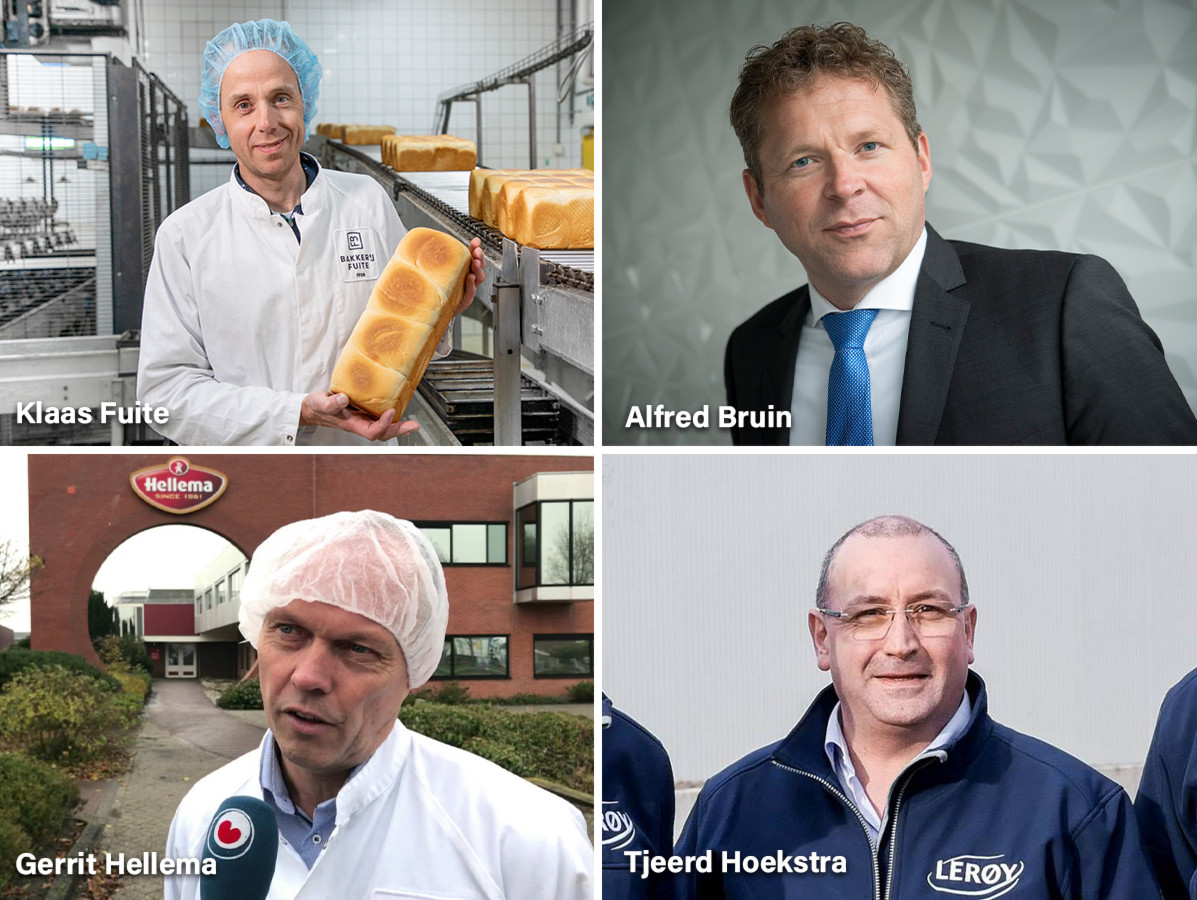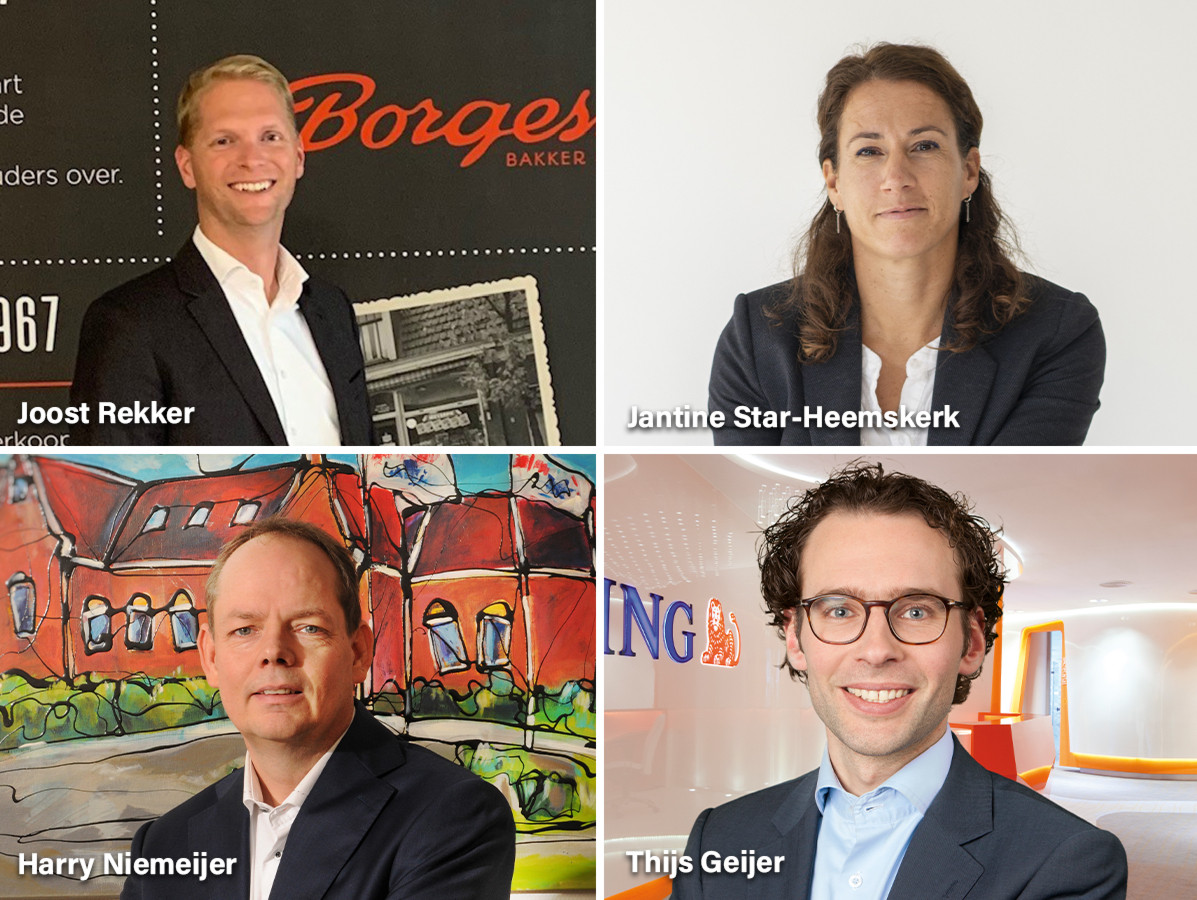
The Netherlands is slowly opening up again. What has changed in the past year due to the pandemic? What is still in store for us? Food entrepreneurs talk about the most striking changes in the market. What will remain unchanged and what will go back to the way it was? Starting with the outcome of ING's research into the impact of the corona crisis on the markets of food companies.
"A distribution of sales markets, both in terms of segments and countries, is definitely anchored on the strategic agenda," says Ceel Elemans, sector banker Food & Agri at ING, and moderator of the meeting. "Previous crises have also demonstrated the need for this."
Klaas Fuite: 'Even within the food retail sector we saw major shifts'
The first lockdown in 2020 hit companies in the food industry particularly hard. There were more losers than winners: while food retail was up 7%, food service shrank by 31%. This probably also explains the slight production loss in the food sector in 2020. Within the entire food market, the market share of retail rose by no less than 10 percentage points last year. "Unprecedented," says Thijs Geijer, sector economist at ING. "That percentage always fluctuates a bit, but usually not more than 1% on an annual basis." In his presentation, he will explain some of the striking results of the recent ING sector study 'The food sector after corona'. Also on the program is Klaas Fuite, CEO and co-owner of Bakkerij Fuite. He talks open-heartedly about the impact of corona on his business.
Despite the easing of restrictions, the meeting will take place online. "Unfortunately," says organizer of the meeting Seine Ligtenberg, director Food & Agri ING with regret in his voice. "We want to connect, and prefer to meet face-to-face for an open discussion." Fortunately, through Teams, the conversation gets off to a good start, led by Ceel Elemans, sector banker Food & Agri. It seems that everyone is now used to this form of communication. "It's great to see how entrepreneurs from the same sector - each with their own specialization and subsector - inspire each other and can learn from each other," says Seine.

Alfred Bruin: 'It was predicted that it would become friendlier. It just gets crazier'
Thijs Geijer immediately picked up on this. On this structural change in the role of online in society, he says: "Working from home has been adopted by many companies as a good alternative to the office. Educational institutions are also permanently moving towards a more hybrid model. This means that more consumption will take place at home in the future. Another direct consequence of these developments, is that the number of transport movements on the road and in public transport will, at least for the time being, be less than before corona. International tourism and business events are also not at their former level for the time being. Not until 2022 at the earliest will there be a normal festival season. The hospitality industry is reopening, but it is a slow start. Retail will want to retain the turnover it attracted last year. With price, position, convenience and product range, they will try to make the supermarkets retain the former hospitality guest as much as possible."
"Even within food retail we saw major shifts," adds Klaas Fuite. "Some smaller retailers couldn't keep up, while others flourished. Another thing that changed the playing field was that at the beginning of the coronapandemic England left the European Union. The country went on lockdown, nothing was imported from England anymore. Partly because of the Brexit, our customer portfolio looks completely different."
Tjeerd Hoekstra: 'At the beginning of the crisis, prices exploded. Now we are back to a normal level'.
The shift in the market from foodservice to retail had many consequences. Jantine Star-Heemskerk, Commercial Director Heemskerk Fresh & Easy, for example, already indicated in the sector study that with the growth in demand from retail, very different products than what they normally sell to foodservice suddenly took center stage. "Our purchasing needs changed. We needed more ingredients for fresh food packages, for example, but much less lettuce."
Joost Rekker, CFO Borgesius, noticed that corona was putting pressure on sales of daily fresh bread in the supermarket. "People started to visit the local bakery more and started to bake more at home. Moreover, the first lockdown meant that overnight we lost 80 per cent of our turnover in sandwiches and wraps. These were sold at AH to go's and petrol stations. In pastry, we saw a huge shift in demand: from complete cakes to single-piece cakes. People still want to enjoy themselves. They want to make the most of it at home. That's a movement you still see in full force."
Tjeerd Hoekstra, CEO Rodé Vis: "It was a shock when we saw the food service sector go downhill. The airline business even went 'down to zero'. Fortunately, we also serve retail, where we were able to make a profit. We were faced with a similar problem as Borgesius: consumers do not buy kilos of smoked fish. The switch from large to smaller packaging called for extra flexibility. It also required a lot more packaging material. That led to hick-ups in delivery times."
Gerrit Hellema: 'Everyone is throwing themselves into raw materials that provide more fibre and less sugar'
Klaas Fuite: "Speaking of flexibility, when everything reopened in the summer of 2020, the catering wholesalers started ordering like crazy. We almost couldn't get it produced. By October, everything was at a halt again. Now with the reopening of the catering industry we are seeing the same thing happening."
Harry Niemeijer general manager and co-owner Elite, recognizes this: "I sometimes don't know where to get the people and raw materials from to keep up with the food service order rush! In periods when the corona measures were tightened and eased, our weekly turnover rocketed in all directions. This was also a reason for temporarily halting various costs and investments. This year we are going to boost our investments again."

Joost Rekker: 'Demand has shifted from whole cakes to single-piece cakes'
The need of consumers to do their shopping online has accelerated due to the corona outbreak. The strong increase in online webshops in 2020 (+40%) therefore does not really come as a surprise. Thijs Geijer: "Many fresh produce specialists set up a webshop, or made improvements, to facilitate more orders. Online meal delivery has also matured, offering consumers a lot of choice. Nevertheless, it will be difficult for this segment to maintain its growth, because it arose out of necessity. Now that people can eat in restaurants again, they are grasping the opportunity with both hands. What will remain is that some of the food producers and traders who normally supply primarily companies (b2b) have started to sell directly to consumers (d2c) in order to tap into an alternative sales channel. Supermarkets like Albert Heijn, Jumbo and Picnic have pushed investments forward, to meet the increased online demand."
Klaas Fuite confirms, "We have been supplying bread to Picnic since 2015. That market literally tripled last year."
Jantine Star-Heemskerk: 'Retailers sold other products. As a result, our purchasing needs changed too'
Corona has increased the focus on healthier products. What has been the impact of this trend on the companies? "As a result, everyone threw themselves into raw materials that provide more fiber and less sugars in products," answers Gerrit Hellema, general manager and co-owner Hellema Hallum: "We already had successful products in that segment, but now we faced a new problem: how can we meet the increased demand while there is a shortage of raw materials? Fortunately, we have employed a few technologists from Wageningen for product development. Investing in knowledge has brought us a lot; we are more flexible to switch from raw material A to B, to achieve the same effect."
Bakery Fuite also ran into raw material shortages. "Due to the enormous growth, our contracts on raw materials ran out much earlier than planned. Furthermore, Asia is making enormous demands on our raw materials market. As a result, we are now confronted with high raw material prices, which also continue to rise. I bought rapeseed oil in January 2020 for 80 cents per liter, now it is already 1.30. We are now paying 15 euros for a pallet and I expect this to double by the end of the year. In the plastic market the daily price applies. Looking at the figures, you have to conclude that you worked very hard last year, but earned nothing."
Harry Niemeijer: 'Our weekly turnover fluctuated wildly'
Alfred Bruin CEO and owner of Royal Steensma: "We have our own plantation in Thailand, the raw materials are there. But how do we get them to the Netherlands? Where container prices, for corona, were around 3,000 euros, that has now risen to 10,000 euros. We can't pass these extra costs on to our customers, certainly not this year. The prediction was that it would be more friendly. It just keeps getting crazier."
Harry Niemeijer: "It's not just oil prices that are skyrocketing. Wheat, plastic, meat; it's all going in a certain direction. As far as I'm concerned, a crisis is welcome!"
Tjeerd Hoekstra is hopeful and tries to encourage the others: "We export a lot of seafood by plane. At the beginning of the crisis, those prices exploded as well. Cargoes went from one to six euros per kilo. That recovered after about three months. We are now back to a normal level. Hopefully the same will happen with containers."
Seine Ligtenberg: 'Great to see entrepreneurs inspire each other'.

Raw material prices and distribution costs will continue to rise for the foreseeable future. This will continue to place firm pressure on returns for food companies. Passing on the extra costs to customers is still difficult.
A large number of companies in the food industry have been able to limit the damage by reacting quickly. Broad-based deployment of multiple sales channels often appears to be the core of success. One of those channels is online; in the past year we saw a sharp increase in online orders in several sectors: both groceries and meal delivery. Both categories grew by some €800 million last year to total sales of €5.5 billion.
Thijs Geijer: 'Online meal delivery has matured'
"We are moving toward a new balance," Ceel Elemans predicts in conclusion. "But we are not there yet. The market has been shaken up too much for that. "In the coming months we foresee waves of new shifts: the first wave is caused by the easing and reopening of the hospitality sector. We expect a second wave of changes, once the one-and-a-half meter measure is lifted."
With all these changes and shifts, are there any developments that are so positive that they are allowed to stay? Klaas Fuite has the final say: "Yes indeed!" he laughs. "People are more aware of their health, of being healthy and staying healthy, because of the coronapandemic. They know that food plays an important role in this; that's where I see opportunities for the industry."
Ceel Elemans: 'We are moving towards a new balance'
Read the full report 'De Voedingssector na corona'(Dutch only)
Source: Vakblad Voedingsindustrie 2021